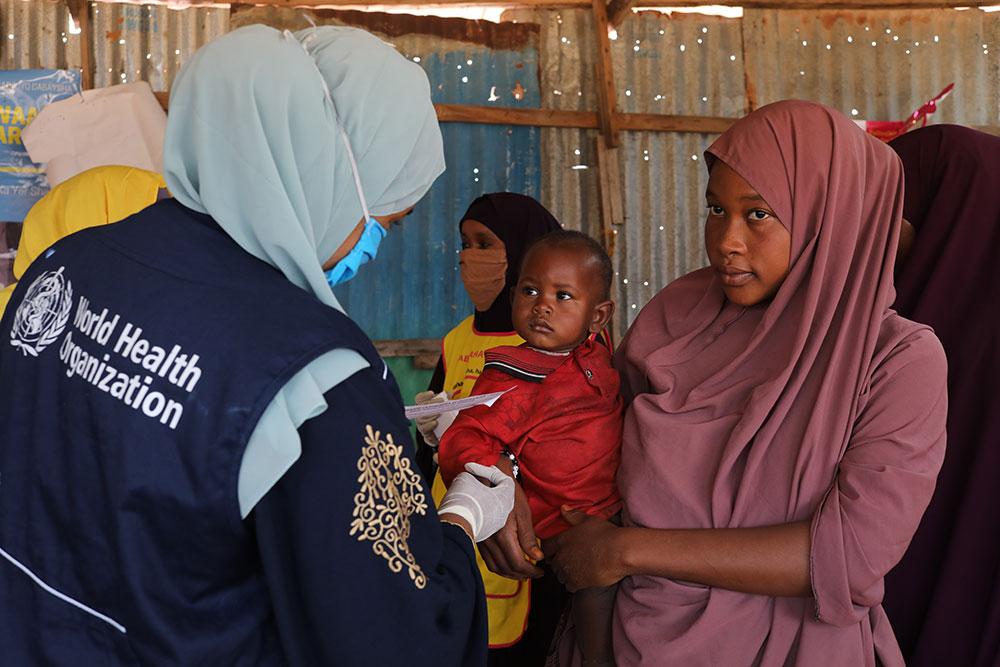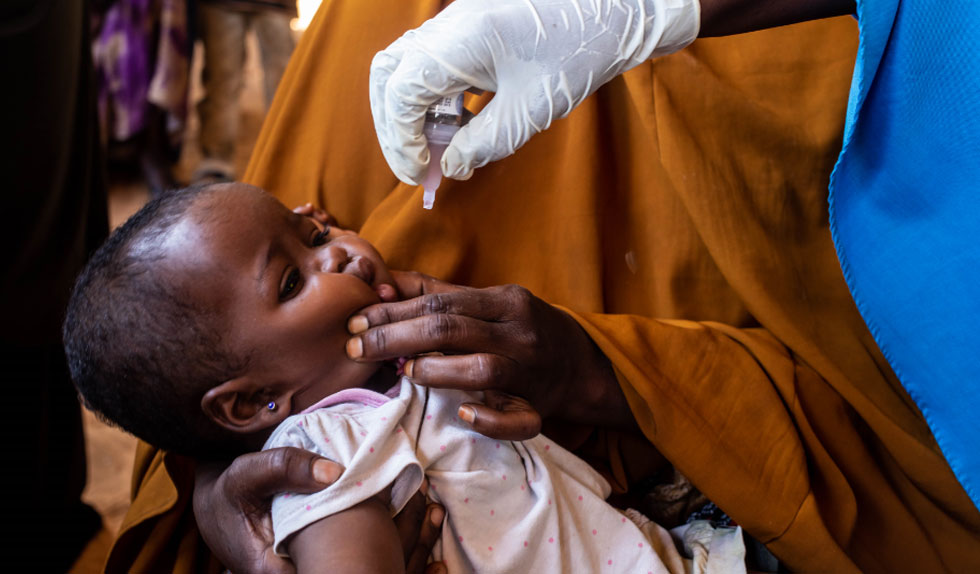
The country is set to launch round two of a polio campaign in the south and central regions
MOGADISHU, 24 October 2020 – On World Polio Day, today, Somalia is celebrating polio workers’ continued commitment to reach and immunize every child in the country to end all forms of polio, and the role they play in strengthening the health system and responding to health emergencies.
Since the inception of Somalia’s polio eradication programme in 1997, hundreds of polio health workers have worked to stop outbreaks of various types of poliovirus, while also extending their support to shield communities from cholera, measles and other diseases.
Polio teams have set up supply chains to deliver vaccines to every accessible corner of the country and to dispatch samples for testing to laboratories in a timely manner. They have also established sensitive and modernized surveillance systems that can raise alerts about diseases within communities, share real-time information with stakeholders and set up social mobilization networks to disseminate health messages in every district of the country. While establishing crucial systems for health delivery and strengthening links between communities and health service providers, the teams have set up strong foundations for public health services.
Since the start of the year, polio health teams have joined the fight against COVID-19 in Somalia, providing support in tracing, tracking and following up on suspected and confirmed cases. Although health workers were forced to pause regular health services to attend to the COVID-19 pandemic, in the last month, Somalia has taken bold steps to resume regular health activities by conducting immunization campaigns to stop the spread of a rare strain of poliovirus.
To end the ongoing outbreak of polio, which has already infected 23 children, the Federal Ministry of Health and Human Services (FMOH) of Somalia, World Health Organization (WHO) and United Nations Children’s Fund (UNICEF) confirm that well-trained health teams will conduct the final round of a two-round house-to-house polio campaign in the central and south regions of the country from 25 to 28 October.
“The first round of this vaccination campaign demonstrated that Somali health workers can be counted on to deliver vital immunization services safely during the COVID-19 pandemic. Using masks, sanitizer, hand washing and physical distancing measures, vaccinators and teams of social mobilizers safely met with families, answered parents’ questions and vaccinated children. Round one was a great success, and we have high expectations for round two,” said HE Dr Fawziya Abikar Nur, Federal Minister of Health.
In line with this year’s theme for World Polio Day, 'A win against polio is a win for global health', Dr Mamunur Malik, WHO Representative in Somalia joined the Minister of Health in commending polio workers.
“Thanks to the strides we have made so far, we would like to believe we are in the final stretch in the polio eradication journey now”, said Dr Malik.
“Every one of us needs to be cautious though, as even with wild poliovirus no longer in Africa, other strains of poliovirus still threaten Somali children. If Somali caregivers join the fight and ensure their children receive polio vaccines every time they are offered, we will be able to kick polio out of Somalia. This will help us to build on the legacy we have built so far, and to stamp out other communicable diseases in the country,” he said.
Some of the main challenges Somalia faces include reaching vulnerable children who are difficult to access due to security and other logistical challenges, and assuring caregivers that polio vaccines are safe for newborns.
“Aiming to reach every single child and providing vaccines to the most vulnerable children is part of our long-standing, collective commitment to child survival in Somalia. We are committed to working with the government and partners to eradicate vaccine-preventable diseases, strengthen routine immunization, and build stronger primary health care systems, so that the country can offer all of its children a better chance to survive and thrive,” said Jesper Moller, UNICEF Somalia Representative a.i.

The upcoming campaign in numbers:
1.65 million children to be reached with oral polio vaccine
8951 vaccinators in urban and rural areas
1125 team supervisors and 364 monitors
3390 social mobilizers spreading information
66 trucks with speakers driving through communities to alert families
62 districts in the south and central regions of Somalia will be covered
All parents and caregivers are reminded to accept vaccines every time they are offered, to give children the best protection against polio.
For additional information, please contact
Fouzia Bhatti
WHO Somalia Communications Officer
Email: This e-mail address is being protected from spambots. You need JavaScript enabled to view it ; Tel: +252 619 235 880
Eva Hinds
UNICEF Somalia Communication Manager
Email: This e-mail address is being protected from spambots. You need JavaScript enabled to view it ; Tel: +252 613 642635
Notes to editors
The strain of polio in circulation in Somalia is different from the wild poliovirus, recently declared eradicated from Africa, but it can also put communities where not enough children have been vaccinated at risk and leave children paralyzed for life.
There are multiple strains of polio, and there is a critical distinction between wild or naturally occurring poliovirus, which is today only found in Afghanistan and Pakistan, and the strain circulating in Somalia today.
In late August 2020, the world celebrated a historic moment: the end of wild poliovirus in Africa. This achievement still stands. There is no wild poliovirus on the African continent. But other strains of polio remain a threat as long as there are communities with low immunity levels.
The only way to eradicate all strains of polio is to vaccinate all children everywhere against polio. In places where polio transmission has long been stopped and immunity levels are high, inactivated polio vaccine (IPV) is used. In places at high risk of poliovirus circulation, and where immunity levels are not as high as they need to be, the best tool for the job is the oral polio vaccine (OPV), which is being used in this vaccination campaign.
This polio campaign is supported by the Global Polio Eradication Initiative (GPEI), an organization dedicated to the eradication of polio. Launched in 1988, the GPEI is spearheaded by national governments, the World Health Organization (WHO), Rotary International, the US Centers for Disease Control and Prevention (CDC) and UNICEF, and supported by key partners including the Bill & Melinda Gates Foundation and GAVI, the Vaccine Alliance.




